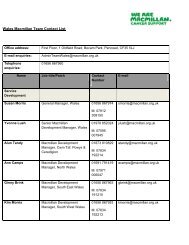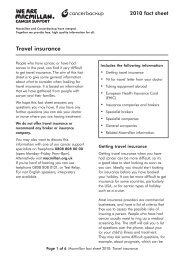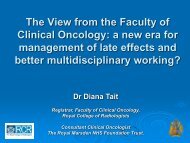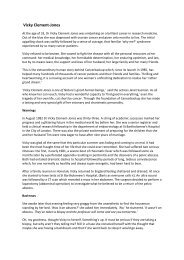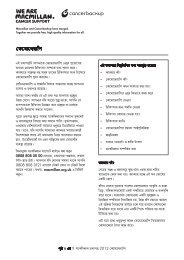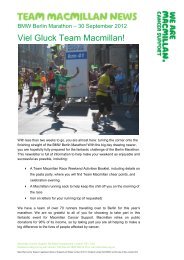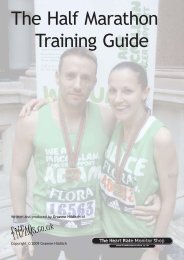Cancerbackup: A brief history - Macmillan Cancer Support
Cancerbackup: A brief history - Macmillan Cancer Support
Cancerbackup: A brief history - Macmillan Cancer Support
You also want an ePaper? Increase the reach of your titles
YUMPU automatically turns print PDFs into web optimized ePapers that Google loves.
<strong><strong>Cancer</strong>backup</strong>: A <strong>brief</strong> <strong>history</strong><br />
May 1984 - Dr Vicky Clement-Jones decides to "kick cancer out of the closet" and to create an<br />
organisation that would combat the conspiracy of silence that surrounded cancer at that time and<br />
provide "information, practical help and advice" for cancer patients and their families and friends.<br />
31st October 1984 - Dr Vicky Clement-Jones holds first Working Party meeting of BACUP (as it was<br />
then known) at St. Bartholomew's (St. Bart's) hospital. BACUP stood for the British Association of<br />
<strong>Cancer</strong> United Patients and their families and friends. She is elected Chairman and Honorary<br />
Director. Dr Maurice Slevin is elected Deputy Chairman and Prof Tim McElwain is elected Chairman<br />
of the Medical and Specialist Advisory Board. In addition to Vicky Clement-Jones and Maurice Slevin,<br />
Prof Kenneth Calman becomes a founder trustee.<br />
3rd December 1984 - The first BACUP Steering Committee Meeting was held in The Dean's<br />
Conference Room at St Bart's Hospital. The members were Peter Belchamber, Prof Kenneth Calman,<br />
Prof Anthony Clare, Dr Vicky Clement-Jones, Dame Mary Donaldson, Prof Tim McElwain, Derek<br />
Reynolds, Dr Maurice Slevin, Elizabeth Sturgeon, Janette Weir, Dr Peter McGuire, Ray Whitfield and<br />
Dr Peter Wrigley.<br />
May 1985 - BACUP moves into first offices on the third floor of 121/123 Charterhouse Street with<br />
Vicky and a skeleton staff. One year lease donated by the Special Trustees of St Bartholomew's<br />
Hospital. Yvonne Terry appointed as the first BACUP cancer information nurse. The balance of<br />
money held in the BACUP account was £26,102.06.<br />
1985 - Dame Mary Donaldson (Former Lord Mayor of London) becomes President of BACUP.<br />
October 1985 - BACUP is launched with four cancer information nurses on the telephone line. Vicky<br />
heads up the very successful publicity campaign and becomes a well-known media personality.<br />
Vicky's British Medical Journal article "<strong>Cancer</strong> and Beyond" is published to coincide with the Launch.<br />
1986 - First issue of BACUP News is published. BACUP has a staff of eleven. Annual running costs are<br />
estimated at £250,000, most of the money coming from the general public. Tim Clement-Jones<br />
becomes trustee. <strong>Cancer</strong> Information Service answering 60 enquiries a day. Concern expressed that<br />
the <strong>Cancer</strong> information Service is overloaded.<br />
Prof Tim McElwain replaces Prof Kenneth Calman as trustee. BACUP nurses help 20,000 people in<br />
first 15 months. BACUP's first annual report is called "Breaking the silence on cancer". Pat Lamburn<br />
joins Executive Committee.<br />
1987 - BACUP opens its Jersey branch. Vicky Clement-Jones flies over for the launch, one of the last<br />
events she attends before her death in July 1987. Maurice Slevin takes over as chairman.<br />
November 1987 - Memorial Service for Vicky Clement-Jones in St Paul's Cathedral. A moving address<br />
given by Prof Tim McElwain.<br />
1988 - The British Medical Journal publishes an analysis of the first 30,000 enquiries handled by<br />
BACUP. The statistics show that BACUP is filling an important gap in the information needs of<br />
patients and those close to them. David Poole and Carolyn Faulder join Executive Committee. Olivia<br />
Dix becomes Chief Executive.<br />
May 1989 - BACUP launches the freephone telephone information service, which enables anyone to<br />
contact the nurses without incurring the cost of the telephone call.
1989 - Tim Clement-Jones suggests using "Helping People Live with <strong>Cancer</strong>" as the BACUP strapline.<br />
Princess Alexandra agrees to become the Royal Patron of the charity.<br />
BACUP is now helping more than 22,000 people a year with its national, free and confidential<br />
information service. <strong>Cancer</strong> nurses are taking approximately 80 calls a day and replying to about 20<br />
written enquiries. It has produced a range of more than 30 different booklets on the most common<br />
cancers and other cancer related topics. The nurses are supported by a library with more than 3,500<br />
cancer related documents.<br />
1990 - BACUP's fifth anniversary since launch.<br />
Tim Clement-Jones cuts the fifth anniversary cake at The Great Hall, St Bartholomew's Hospital,<br />
London.<br />
More than 100,000 people have been helped. BACUP launches its face-to-face counselling service,<br />
available to people who can come to the London offices. Prof Tim McElwain dies.<br />
1991 - The first BACUP ball, a masked masquerade, is held at the Hyde Park hotel.<br />
1992 - BACUP is enabled to move into its present premises at 3 Bath Place, London with a generous<br />
donation from Mr Teddy Yip, father of Vicky Clement Jones. Prof Michael Whitehouse becomes<br />
Chairman of the Medical and Specialist Advisory Board (Later changed to the Medical Advisory<br />
Committee). Alan Watson becomes chief executive.<br />
1993 - BACUP becomes a company limited by guarantee. The first trustees (directors) are Dr Maurice<br />
Slevin (chairman), Tim Clement-Jones, David Donne, Dr David Poole. Loretta Tinckham and Pat<br />
Lamburn appointed Trustees and directors.<br />
1994 - BACUP nurses are now answering more than 34,000 telephone calls and letters a year.<br />
1995 - BACUP Scotland opened in Glasgow. Publications increasingly adopted and translated by<br />
cancer organisations around the world. Budget £1.4 million. Jean Mossman becomes chief executive.<br />
1996 - BACUP takes on an advocacy role. Appointment of Lesley Fallowfield and David Amos as<br />
Trustees<br />
1997 - BACUP launches its website with all its publications available in full on line. Over 1500 pages<br />
of cancer information written specifically for cancer patients on all aspects of cancer available on the<br />
website, together with a searchable database of over 700 support groups and organisations for<br />
cancer patients in the UK. Tim Bell becomes trustee. Professor Nick Thatcher becomes chairman of<br />
Medical Advisory Committee.<br />
Lesley Fallowfield suggests the name <strong>Cancer</strong>BACUP. The reason for the change is simple: including<br />
the word cancer in the name says what the organisation does and ensures that it can be found easily<br />
and quickly in telephone directories, indexes, databases and on the internet.<br />
1998 - BACUP becomes <strong>Cancer</strong>BACUP. CD Rom version of website launched - all publications and the<br />
searchable database available on a CD Rom. First regional centre opened at Nottingham City<br />
Hospital with a trained <strong>Cancer</strong>BACUP nurse. Dr Terry Priestman becomes chairman of the newly<br />
formed Medical Editorial Board.<br />
1999 - <strong>Cancer</strong>BACUP nurses now helping more than 46,000 patients and their families a year.<br />
<strong>Cancer</strong>BACUP publishes fifty-four booklets ranging from 24 to 60 pages covering all aspects of cancer<br />
and its treatment, as well as publications on living with cancer. There are also over seventy fact
sheets covering less common cancers and treatments. The website was visited by over 35,000<br />
unique URL's and had nearly 750,000 pages viewed each month.<br />
<strong>Cancer</strong>BACUP local centres opened in Coventry and London. We advise the National Health Service<br />
on the needs of cancer patients. Alastair Ross Goobey and Michael Hoare become <strong>Cancer</strong>BACUP<br />
trustees. <strong>Cancer</strong>BACUP budget £2.5 million.<br />
2000 - Further <strong>Cancer</strong>BACUP local centres are opened: in September at the Christie Hospital in<br />
Manchester; in October at the <strong>Cancer</strong>CARE centre in Kendal; in November at St Bartholomew's<br />
Hospital and, in partnership with the CrocusTrust, at the Charing Cross Hospital - both in London.<br />
Chief executive Jean Mossman leaves after five years' service.<br />
2001 - Joanne Rule appointed chief executive. There are three changes to the board of trustees:<br />
Peter Caplan joins; Dr David Poole resigns after many years' involvement with the charity; and sadly,<br />
Michael Hoare died.<br />
<strong>Cancer</strong>BACUP extends its information and support services with the creation of the <strong>Cancer</strong>Qs - a<br />
web-based facility providing access to questions and answers about cancer. The new service is<br />
launched by Sheila Hancock, one of the charity's patrons.<br />
<strong>Cancer</strong>BACUP speaks out on three main issues: the right to information, access to the most effective<br />
cancer treatments, and the best possible quality of life. <strong>Support</strong>ed by an educational grant,<br />
<strong>Cancer</strong>BACUP launches its first national advertising campaign to highlight the problem of cancer<br />
related fatigue. Towards the end of the year it launches it Freedom from Pain campaign to<br />
encourage better communication between patients and health professionals on pain control.<br />
2002 - <strong>Cancer</strong>BACUP's cancer information specialist nurses answer more than 53,000 enquiries by<br />
telephone, email and face-to-face from people affected by cancer. Approximately 250,000 booklets<br />
and factsheets are distributed in the year; <strong>Cancer</strong>BACUP's website is visited by up to 120,000 people<br />
a month.<br />
The charity expands its information service - thanks to voluntary donations. The charity opens a new<br />
centre in Glasgow, housing five additional nurses and offering callers a seamless service regardless of<br />
whether their call is answered by a nurse in London or Glasgow. The <strong>Cancer</strong>BACUP NHS microsite is<br />
launched: an offshoot of the main website, the microsite is designed specifically for cancer<br />
professionals to enable them to develop and implement local information strategies - and in turn<br />
help cancer patients.<br />
Usage of local centres increases significantly. In marked contrast with the usage of <strong>Cancer</strong>BACUP<br />
centres located in hospitals, however, very few people used the service in Kendal which closed in<br />
March.<br />
Dr Asha Saini appointed <strong>Cancer</strong>BACUP's medical adviser; Dr Terry Priestman steps down as Series<br />
Editor but continues to work with <strong>Cancer</strong>BACUP on the <strong>Cancer</strong>Qs. A new, multi-disciplinary Clinical<br />
Advisory Board, chaired by Dr Adrian Timothy, replaces the Medical Advisory Committee and<br />
Medical Editorial Board. Its purpose is to ensure the medical accuracy of all forms of information<br />
provided by <strong>Cancer</strong>BACUP and to offer clinical advice on cancer issues.<br />
2003 - Long established as a valuable source of information and reference, <strong>Cancer</strong>BACUP's website is<br />
redesigned to make it more user-friendly for the thousands of people who visit it each week,<br />
enabling them to reach the information they need as quickly as possible. All content can be found<br />
within 3 clicks of the home page. The website achieves full partnership status with NHS Direct
Online. This means that it meets core information and web accessibility standards and is linked<br />
prominently to NHS Direct Online.<br />
<strong>Cancer</strong>BACUP calls for better public information about cancer and genetics and launches the first<br />
nationally available guide to cancer and genetics. The guide replaces popular myths surrounding<br />
cancer and genes with reliable facts. It is aimed at anyone who is worried that they may have<br />
inherited an increased risk of cancer.<br />
'<strong>Cancer</strong> in Your Language', a helpline interpreting service is launched in July. People whose first<br />
language is not English can now contact the helpline and be linked into an interpreter. Over 100<br />
languages are now covered. In addition, there are 12 extra freephone lines for the most commonly<br />
spoken languages through which callers can speak directly to an interpreter, who will then link into a<br />
<strong>Cancer</strong>BACUP nurse. These 12 extra lines are for Arabic, Bengali, Cantonese, French, Greek,<br />
Gujarati, Hindi, Polish, Punjabi, Turkish, Urdu and Vietnamese, representing 60-65% of British<br />
minority ethnic communities.<br />
<strong>Cancer</strong>BACUP unveils the first UK-based website dedicated to helping professionals find jobs in the<br />
cancer care, oncology and haematology fields. Developed in partnership with e-recruitment<br />
specialist, The Internet Corporation, www.cancerjobs.net carries details of vacancies in all of the<br />
specialist fields surrounding cancer care and research at all levels.<br />
There are two new members on the board of trustees: Hilary Cropper CBE and David McDonough<br />
OBE.<br />
2004 - <strong>Cancer</strong>BACUP's freephone helpline hours are extended – and are now open from 9am to<br />
8pm, Monday to Friday - so that more people are able to get through more easily to its team of<br />
specialist cancer information nurses. The charity is also able to expand its email enquiry service –<br />
thanks in part to new technology that gives the nurses more flexibility in their working times,<br />
enabling them to increase their hours by working from home.<br />
A new local centre is opened in the <strong>Cancer</strong> <strong>Support</strong> Centre at Torbay District General Hospital, giving<br />
more people in the southwest the opportunity to talk to a <strong>Cancer</strong>BACUP nurse in person. As well as<br />
the <strong>Cancer</strong>BACUP Information Centre, the <strong>Cancer</strong> <strong>Support</strong> Centre has other rooms where related<br />
support services, for example wig fitting, are provided and groups can meet.<br />
A <strong>Cancer</strong>BACUP guide to breast reconstruction is awarded first prize for patient information in the<br />
BMA Medical Book Competition Awards 2004, with three other booklets and the charity's website<br />
receiving 'highly commended'.<br />
The charity continues to campaign on behalf of every cancer patient to ensure that they receive the<br />
best possible treatment and services. Its Postcode Prescribing media campaign leads directly to a<br />
government investigation and practical steps to tackle the problem. Its Private Medical Insurance<br />
campaign leads to a commitment from insurers to be more transparent about their cancer cover.<br />
<strong>Cancer</strong>BACUP's report on waiting times, Living with cancer: waiting for treatment, makes it clear<br />
that NHS waiting times targets are not being met and provides a number of recommendations on<br />
how standards might be improved.<br />
Sadly, Dame Hilary Cropper DBE, one of <strong>Cancer</strong>BACUP's trustees, died in December.<br />
2005 - Another local centre is opened, this time in Ipswich Hospital. <strong>Cancer</strong>BACUP now has a centre<br />
in nine locations across the country. Its local centres each handle more than a thousand enquiries<br />
every month.
<strong>Cancer</strong>BACUP launches its own website specifically for teenagers affected by cancer. TIC (Teenage<br />
Information on <strong>Cancer</strong>) at www.click4tic.org.uk is a website teenagers with cancer can really call<br />
their own – it not only provides facts on cancer and its treatments and advice on how to cope, but<br />
also allows teenagers to share their stories and tips with others.<br />
The charity continues to seek innovative ways to reach those who need its help. <strong>Cancer</strong>BACUP pilots<br />
a scheme to develop a touch-screen kiosk service, extending access to information to those who<br />
may not have any IT skills. Touch-screen kiosks are being located in clinics and hospitals, as well as<br />
libraries and care homes. The information is drawn directly from <strong>Cancer</strong>BACUP's website and is<br />
therefore of high quality and kept continually up-to-date. <strong>Cancer</strong>BACUP wins the UK Charity Award<br />
for Best Use of Technology for the touch-screen kiosks.<br />
<strong>Cancer</strong>BACUP's report on its Work and <strong>Cancer</strong> campaign presents a series of recommendations for<br />
policymakers, health professionals and employers, and a booklet helps patients cope with the work<br />
issues they may face.<br />
The charity welcomes three new trustees: Sir Ronald de Witt, Professor Amanda Ramirez and Sir<br />
Peter Stothard.<br />
2006 - <strong>Cancer</strong>BACUP becomes <strong><strong>Cancer</strong>backup</strong> with new colours and brand design and launches the<br />
first nationally available series of audio tapes for an estimated one million people with a print<br />
disability affected by cancer at some point in their lives, and the first public touch-screen service<br />
dedicated to providing instant information on cancer.<br />
<strong><strong>Cancer</strong>backup</strong> wins Patient Website of the Year in the Patient Association Awards 2006. The award<br />
completes a hat-trick of wins for the website, which has previously received similar accolades from<br />
the BMA Patient Information Awards and the national Healthcare IT awards.<br />
2008 - <strong><strong>Cancer</strong>backup</strong> merges with <strong>Macmillan</strong> <strong>Cancer</strong> <strong>Support</strong>. Ciarán Devane, chief executive of<br />
<strong>Macmillan</strong> says: ‘This merger is excellent news for our information vision to develop and provide the<br />
highest quality cancer information. We will reach out to everyone affected by cancer in order to<br />
answer any question on any cancer and to provide the comprehensive information necessary to<br />
support people living with cancer. This merger means that we will take a massive step closer to<br />
achieving this vision. People affected by cancer will have one, respected and recognised, source of<br />
cancer information.‘


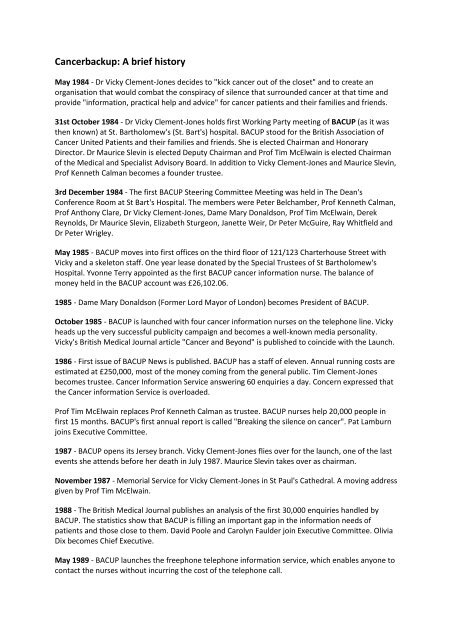
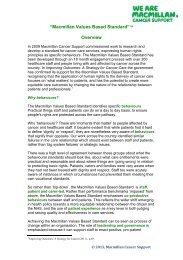
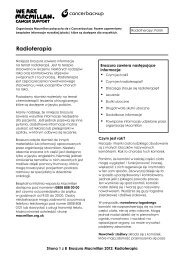
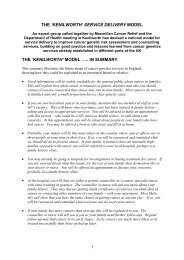

![Providing Person-Centred Cancer Care in Wales Toolkit [PDF]](https://img.yumpu.com/15693949/1/184x260/providing-person-centred-cancer-care-in-wales-toolkit-pdf.jpg?quality=85)

